The Ukrainian grain crisis continues as a result of Russia’s blockade of Black Sea ports, which prevents Ukrainian wheat shipments. As the war continues, the stocks of countries that rely on Ukraine for wheat are diminishing. A possible famine is looming. Everyone agrees on the necessity to solve this problem to avoid a major humanitarian crisis. But how?
The long term impacts of war manifest themselves in various ways. The Ukrainian grain crisis has dominated the media because it has the potential to trigger a global food crisis, particularly in North Africa and the Middle East. Russian warships have closed the ports of Odesa, Chornomorsk, and other Black Sea ports, forcing grain to be transported via congested, inefficient land routes. With limited alternative capacity and only land routes available, 90 percent of Ukraine’s grain exports cannot be transported.
The Food and Agriculture Organization (FAO) estimates that 25 million tons of grain are stored in silos at Ukrainian ports. This has serious implications for global food supplies. Global grain prices have reached an all-time high. There are many analyses on this subject, so, no need to explain why it is vital to open the routes of the Ukrainian ports for shipping.
Efforts to break the Russian blockade
From the beginning of the war, the Russian Black Sea Fleet took control of the northern Black Sea. The fleet played two critical roles in this war: It cut off the connection of Ukraine by imposing an embargo operation in the region, and it supported land forces by deploying Kalibr land-attack missiles from surface ships and submarines.
The Russian fleet operated independently near the Ukrainian coast until Ukraine engaged and sank the cruiser Moskva with two Neptune anti-ship missiles. In addition to the trauma of losing its flagship, the Black Sea Fleet also lost its “area air defense” capability. As a result, Ukraine struck several Russian patrol boats with TB2 Bayraktar armed drones near Snake Island. These casualties decreased Russian naval activities off the coast of Odesa dramatically.
The Moskva incident also made clear that the Russian fleet has some problems defending against anti-ship missiles, and Ukraine built a layered surface defence by acquiring land-based Harpoon missiles from Denmark, Brimstone missiles from the United Kingdom, and RBS-17 (or Robot-17) missiles from Sweden. With this reinforcement, Ukraine formed a 75 NM A2/ AD (Anti Access/Area Denial) zone in the region by posing a direct threat to Russian assets.
Although the U.S. and European countries have supplied many weapons and systems to Ukraine, anti-ship missiles appear to be the only means of breaking the blockade. These missiles will have a deterrent effect on the Russian fleet, but may not be enough to keep the area clear. This is because Russian submarines, which cannot be engaged with anti-ship missiles, are active in the region, and the Russian surface fleet is capable of detecting and engaging ships from a great distance.
Further measures are needed to break the blockade and open traffic for the transport of Ukrainian grain.
Can NATO play a role to open the routes?
The worst-case scenario in the Russian-Ukrainian war is a possible hot contact between Russia and NATO. Although the countries of NATO support Ukraine, both sides appear to be maintaining a delicate balance to avoid an undesirable escalation between the two nuclear powers. If a hot contact between NATO and Russia were to occur, it is difficult to assess where the escalation would lead.
There are several opinions and theories on the use of NATO warships to escort cargo ships to get the grain from Ukrainian ports, as well as to clear the sea mines in the region, but several issues are needed to be considered.
The first issue is the Montreux Convention. Turkiye has closed passage through the strait to warships in accordance with the Convention. Russia considers NATO part of the conflict (Russia hasn’t officially declared war on the conflict) and would probably consider this move a breach of the Convention,
It is difficult to assess Russia’s attitude toward the NATO convoy. Breaking the blockade without Russia’s consent would be a major loss of deterrence for Russia. The unpredicatble Russian president Putin could give the order to attack the NATO forces no matter where the escalation leads.
The sea mines off the coast of Odesa must be cleared to ensure safe passage for merchant ships. However, due to mutual distrust, it seems uneasy to launch an MCM operation in the area. First, it’s still unclear who laid the mines (the exact locations of the mines should be provided); second, mines could still be floating there (there will be a floating mine threat for the assets undertake mine-clearing ops); and finally, due to the nature of MCM operations, an MCM operation wouldn’t be possible without Russia’s consent. On the other hand, clearing mines could weaken Odesa’s defences against an amphibious operation, so Ukraine might oppose clearing all mines in the region without getting guarantee from Russia.
The French presidency reportedly declared on Friday it was ready to participate in an “operation” allowing to lift the blockade of Odesa. “We are at the disposal of the parties so that an operation is put in place which would allow access to the port of Odesa in complete safety, that is to say to be able to allow boats to transit despite the fact that the sea is mined” an advisor to the president Macron told French TV station TF1.
Diplomacy is still the best tool
It is clear that Putin is using the food crisis as a weapon. Russia considers the grain shortage caused by the blockade as a card that can be used in negotiations. On the other hand, as mentioned above, an operation without Russia’s consent may lead to an undesirable escalation between NATO and Russia. Consequently, a mutual agreement is needed to resolve this crisis without a hot contact between two nuclear powers.
READ ALSO: Putin compare self to Peter the Great, Russia to destroy all of Donbas
In this case, the United Nations might be the right address to overcome this crisis. As in other conflicts around the world, a UN naval escort can be formed from naval forces of different, usually neutral, countries. To address Russia’s security concerns, the UN can guarantee that merchant ships will not carry weapons, and even a Russian ship can be represented in the UN escort force to be formed. This escort force may consist of two subgroups: Escort frigates to protect merchant ships carrying grain and MCM ships to open safe corridors to Ukrainian ports.
The most sensible address for the command of such a naval force seems to be Turkey. This is because Turkey is not only a NATO country but also maintains good relations with Russia and Ukraine. It should be noted that Turkey hosted the negotiations to end the aggression and resolved the Sunflower oil crisis with telephone diplomacy between the leaders (Erdogan and Putin).
Thus, if a Turkish admiral would lead an escort force consisting of various countries as well as an MCM force to open the routes, it would be welcomed by both sides. The Turkish Navy is experienced in leading such forces and has enough capabilities to undertake such a mission, and Turkey has regional advantages in addition to its relations with the warring states.
Everyone should realize that this is a humanitarian crisis, no matter what the cause. All countries must undertake what is needed to prevent famine. This crisis should be handled apart from the war, and a naval force to be created as early as possible to ensure the transportation of Ukrainian grain by sea. This force must be approved by both sides, and diplomacy stands out as the best tool to provide a solution.














